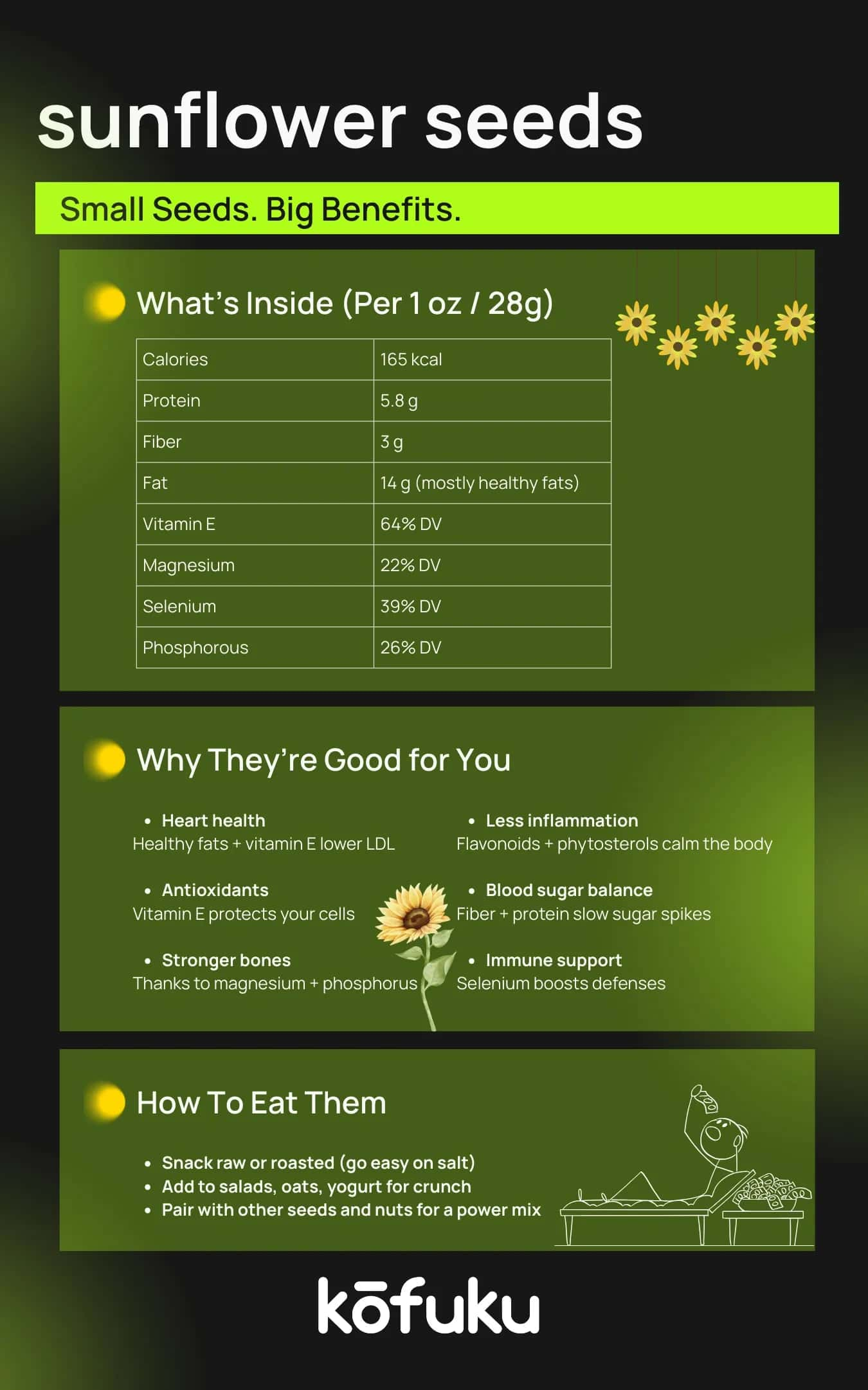Are Sunflower Seeds Good for You? Nutrition, Benefits, and Planting Guide

Introduction
During winter evenings in India, it is common to find families snacking on roasted seeds or adding a handful to their breakfast. One of the most popular seeds used here is the sunflower seed. They are more than just a passing snack because of their nutty flavour, nutritional worth, and flexibility.
But how are they good for you, and how can they fit into a balanced lifestyle? We will examine nutritional details of sunflower seeds, their health benefits, the most effective ways to eat them, and even some simple steps for planting your very own.
Nutritional Information of Sunflower Seeds: What Makes Them Healthy
The seeds of sunflowers are rich in proteins, fibre, and unsaturated fats (primarily polyunsaturated and monounsaturated). Both are also rich in vitamin E, a potent antioxidant, as well as B vitamins like folate and niacin, which are crucial for metabolism and brain health.
There are also minerals, including magnesium, selenium, copper, and zinc, which are plentiful and help to maintain bone strength, thyroid, and immune functions. The nutrient content is what makes sunflower seeds a common choice in healthy diets.
It contains anti-inflammatory substances in the form of flavonoids and phenolic acids, which are plant compounds contained in a single serving of seeds. It is the combination of vitamins, minerals, proteins, and plant elements that all work together to make the sunflower leaf not only a symbol of visual vitality but also a reminder of the nutritional richness.
Key Health Benefits of Sunflower Kernels You Should Know
The seed kernel, or edible inner part of the seed, contains a majority of the nutrients, which contribute to the sunflower kernel benefits you can enjoy. Here are some of these:
-
Heart Health: The presence of unsaturated fats and vitamin E lowers bad cholesterol while supporting healthy circulation.
-
Immune Support: Zinc and selenium support the immune system and reduce oxidative stress, which helps combat infections.
-
Skin and Hair: Vitamin E promotes skin elasticity and scalp health, while fatty acids nourish hair growth.
-
Mental Well-being: Magnesium helps regulate mood and reduce stress, making sunflower kernels a supportive snack for mental health.
-
Bone Strength: The mineral density supports bone development, particularly important for growing children and ageing adults.

Calories in Sunflower Seeds and How Much to Eat Daily for Optimal Health
While a healthy snack, the calories in sunflower seeds are a key consideration for those seeking to control their weight. A standard serving of about 28 grams of seeds, equivalent to a small handful, contains approximately 160-170 calories. It also includes six grams of protein, 14 grams of healthy fats, and three grams of fibre.
It’s important to note that most of these calories come from the kernel, the edible part of the seed. This makes their calorie count similar to that of other popular nuts, such as almonds or cashews, which are also high in energy density.
The ideal daily intake of sunflower seeds depends on your dietary goals. For most adults, consuming one to two handfuls (about 30 to 60 grams) per day is an excellent way to reap the health benefits without consuming excess calories. Practicing mindful eating helps you enjoy the nutrients from these seeds while staying on track with your weight loss plan.
How Roasted Sunflower Seeds Compare to Raw: Nutrition and Taste
Raw seeds suit those who want to preserve the most nutrients in their diet, especially people whose eating habits are oriented towards raw and unprepared food.
Roasted options are more appealing for everyday snacking. Salted roasted seeds should be consumed in moderation, especially for individuals with high blood pressure. Both can be used imaginatively, in cooking, snacking mixes, and so on, to sprinkle around a soup or a yoghurt dish.
Refined Sunflower Oil: Uses, Benefits, and What is Freedom Refined Sunflower Oil
Another significant form of the seed's product is refined sunflower oil, which has widespread popularity in Indian kitchens. It is valued for its light flavor, high smoke point, and ability to balance diverse cooking styles. The oil contains a high amount of vitamin E and is low in saturated fat, making it a preferred alternative to other popular cooking oils.
Major refined sunflower oil brands, such as Freedom Refined Sunflower Oil, advertise their products as being free of harmful additives, allowing people to use them when cooking without compromising the natural properties of sunflower seeds.

How to Plant Sunflower Seeds: A Simple Guide to Growing Your Own Sunflowers
In addition to their nutritional value, planting sunflower seeds is a rewarding practice. Growing sunflowers is easy, whether you're doing it in a home garden or on a small farm. The first step is to obtain good seed of sunflowers to use as a planting material.
Choose a place that receives ample sunlight, as sunflowers require at least six to eight hours of direct sunlight each day.
The land must have optimum drainage and moderate fertility. Plant seeds at approximately 2.5 cm and 15 cm apart. Water sparingly, but not too much. In a couple of days, a sprout will emerge, and as the days go by, it grows tall, with deep green and beautiful yellow flowers.
Sunflower Seeds and Pumpkin Seeds: Comparing Their Benefits
A frequent comparison in nutrition discussions is between pumpkin seeds and sunflower seeds. While both are nutrient-dense, their profiles differ slightly.
-
Sunflower Seeds: Higher in vitamin E and selenium, making them powerful antioxidants.
-
Pumpkin Seeds: Richer in zinc, iron, and magnesium, which support immunity and men’s health in particular.
Visual Guide: Pictures and Images of Sunflower Seeds and Leaves
As one learns the physical appearance of sunflower plants, one can examine sunflower seeds by viewing the small, oval, striped shell with a kernel in it. Several images of sunflower seeds depict their shapes, whether in raw, roasted, or hulled conditions.
Likewise, the sunflower leaf is large, rough, and bright green, with a high ability to receive sunlight. These visual identifying features not only make gardening easier.

FAQs
Q. What are the main health benefits of sunflower kernels?
A. Sunflower kernels provide protein, fibre, vitamin E, magnesium, and healthy fats. They support heart health, boost immunity, improve skin health, and help manage cholesterol when eaten in moderation.
Q. How many calories are in sunflower seeds?
A. A 28-gram serving of sunflower seeds contains around 165–170 calories, mostly from healthy fats and protein. The exact calories in sunflower seeds vary slightly depending on preparation and roasting.
Q. What is the nutritional information of sunflower seeds?
A. Sunflower seeds are rich in vitamin E, B vitamins, magnesium, protein, fibre, and healthy fats. They also provide antioxidants, iron, zinc, and selenium, supporting energy, immunity, and overall health.
Q. How many sunflower seeds should I eat daily?
A. A handful of about 28-30 grams of sunflower seeds daily is recommended. This portion balances nutrients and calories, avoiding excess intake while providing heart-friendly fats, protein, and fibre.
Q. Are roasted sunflower seeds healthier than raw ones?
A. Raw seeds retain maximum nutrients, while roasted sunflower seeds offer enhanced flavour and crunch. Light roasting keeps most nutrients intact, though excessive roasting may slightly reduce vitamin content and increase sodium.
Q. What is refined sunflower oil, and how is it different from regular oil?
A. Refined sunflower oil is processed for stability, longer shelf life, and neutral flavour. Compared with unrefined oils, it withstands high-heat cooking but loses some natural antioxidants during refining.
Q. How do I plant sunflower seeds successfully?
A. Plant sunflower seeds in well-drained soil with full sunlight. Sow directly outdoors after frost, space seeds 6 inches apart, water regularly, and thin seedlings for strong growth and tall blooms.
Q. What are the benefits of sunflower seeds compared to pumpkin seeds?
A. Both seeds provide protein, fibre, and minerals. Sunflower seeds are richer in vitamin E, while pumpkin seeds excel in zinc and magnesium. Together, they support heart, immunity, and metabolic health.
Q. Can sunflower seeds help with skin and heart health?
A. Yes, sunflower seeds are rich in vitamin E, antioxidants, and healthy fats. They promote glowing skin, reduce inflammation, lower bad cholesterol, and support cardiovascular wellness when eaten in balanced amounts.

Potassium-Rich Diet Tips to Boost Your Nutrient Levels

Benefits of Coconut Sprouts: Nutrition in a Nutshell

Comprehensive Guide to Superfood Nutrition for Better Health

Healthy Family Nutrition Tips for Strength and Togetherness

Nutrition and Healthy Eating: Why Bone Health Supplements Matter


